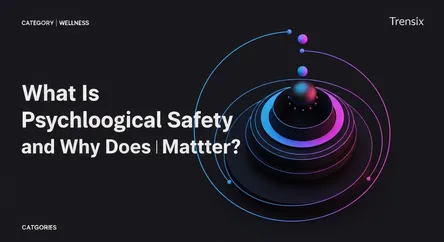Wellness
What Is Psychological Safety and Why Does It Matter?

An explanation of psychological safety, a key factor for creating inclusive, innovative, and high-performing teams in any environment.
What is it?
Psychological safety is the belief that you won't be punished or humiliated for speaking up with ideas, questions, concerns, or mistakes. It's a shared feeling within a group that the environment is safe for interpersonal risk-taking, allowing individuals to express themselves without fear of negative consequences. In a psychologically safe space, team members feel accepted, respected, and comfortable being vulnerable, admitting errors, or challenging the status quo. This concept is crucial for building trust and fostering open communication.
Why is it trending?
The focus on psychological safety has grown significantly due to changes in the modern workplace, accelerated by the COVID-19 pandemic. With the rise of remote and hybrid work models, creating a supportive and inclusive culture has become a priority for organizations. There's a greater emphasis on employee mental health, well-being, and creating environments that foster diversity and innovation. Companies recognize that for teams to be agile, resilient, and creative, employees must feel secure enough to contribute fully and authentically.
How does it affect people?
The presence of psychological safety has a profound impact on individuals. It lowers stress and anxiety, as people feel secure and supported at work. This leads to higher employee engagement, increased job satisfaction, and better overall well-being. People are more likely to share creative ideas, collaborate effectively, and learn from mistakes, which boosts team performance and innovation. Ultimately, it creates a healthier, more productive environment where individuals feel valued and empowered to do their best work.